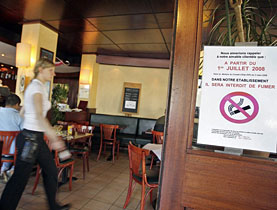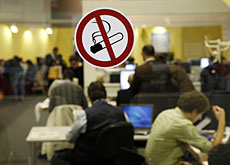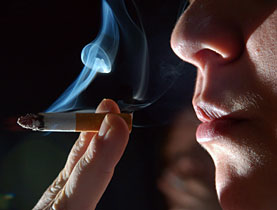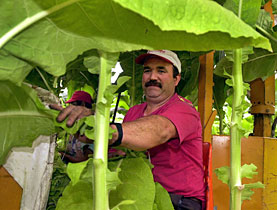Geneva and Zurich stub out smoking

There will be no more need for ashtrays in public buildings in Geneva and in Zurich as smoking bans come into force in Switzerland's two largest population centres.
Of the two cantons, Geneva introduced a stricter ban on Tuesday, which includes bars and restaurants, while Zurich has only outlawed smoking in public buildings.
Simon Küffer of the Swiss Lung League welcomed the moves by Geneva and Zurich to protect the public from the risks of passive smoking. “We are particularly pleased about the full ban in Geneva and also glad to see Zurich moving in the right direction,” he told swissinfo.
“We hope the Zurich ban will be extended to bars and restaurants after the vote on the issue on September 28,” he added.
Switzerland lags behind its European neighbours when it comes to anti-smoking legislation, but measures are gathering pace at the cantonal and federal levels.
The southern Italian-speaking Ticino region became the first canton to introduce a smoking ban in indoor public places in April 2007.
Tuesday’s additions bring to seven the number of cantons with some level of smoking restrictions in public places. Most of the remaining 19 cantons have similar projects in the pipeline.
Patchwork
While the patchwork of differing smoking bans continues to develop independently in the cantons, the issue is also being addressed, albeit at a snail’s pace, at federal level.
Last month, the House of Representatives rejected a plan by the Senate to ban smoking in restaurants. However, it came out in favour of granting the country’s 26 cantonal authorities the right to impose tougher rules than on a federal level.
The situation leaves visitors to the country encountering different smoking regulations every few kilometres.
There is no confusion for Switzerland’s train passengers, however; smoking has been banned on the entire Swiss public rail network since December 2005.
Küffer pointed out that the snowball effect of the individual cantons adopting smoking bans would ultimately lead to a de facto countrywide ban. “But we would still like to see a stronger federal law on the issue.”
Fines
In Geneva, anyone who lights up in a public building, bar or restaurant, now risks a fine of SFr100 ($98.28) to SFr1,000. Determined smokers will still be able to puff away in Geneva’s prison cells, private hospital rooms and in designated hotel rooms.
It seems that train stations are a grey area in Zurich, with covered platforms still deemed smoking-friendly while the station buildings will be smoke-free. Authorities and the rail company are still wrangling over the status of the partially open station concourse at Zurich main station.
The gradual stubbing out of cigarettes in Switzerland is part of a Europe-wide anti-smoking trend.
While England looks back on one year of smoke-free workplaces and public places, in the Netherlands a tobacco ban in cafes, bars and restaurants came into force on Wednesday.
swissinfo with agencies
Some 29 per cent of the Swiss population smokes, according to 2007 figures.
About 8,300 people die from tobacco consumption in Switzerland annually.
There are around 16,000 cases of disability attributable to smoking.
In the six cantonal votes on smoking bans that have taken place to date, support for some form of ban has been very strong, up to 79 per cent in Geneva.
Ticino
Geneva
Zurich
Solothurn
Graubünden
Aargau
St Gallen
On July 1, 2007 England introduced a full smoking ban. New research shows that an estimated 400,000 people gave up the habit in the first nine months after the ban.
The study by Cancer Research UK suggested the ban contributed to a 5.5 per cent fall in smoking rates in the nine months after the law changed – the largest fall on record.
It was the world’s first detailed study into how a ban may affect smoking rates without the influence of any other tobacco-control measures, such as higher taxes.
Separate research by Nielsen said cigarette sales had dropped by six per cent since the ban.

In compliance with the JTI standards
More: SWI swissinfo.ch certified by the Journalism Trust Initiative



You can find an overview of ongoing debates with our journalists here. Please join us!
If you want to start a conversation about a topic raised in this article or want to report factual errors, email us at english@swissinfo.ch.